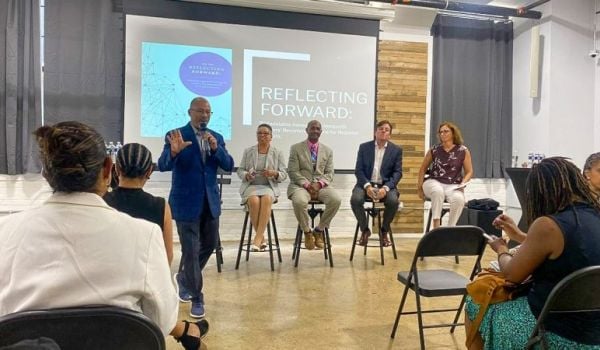From Seattle to Dallas to Washington, D.C., contractors vying for government bids have used sham companies to give the illusion that they work with firms not owned by able-bodied white men. Meanwhile, firms owned by actual minorities, women or the disabled continue to struggle landing deals comparable to those of their counterparts. In Forefront this week, journalist Patrick Kerkstra turns to Philadelphia, where numbers are improving thanks to ramped-up enforcement and stronger protections, to find out how cities can stop the scamming.
“Your foot hurt?” U.S. Rep. Tammy Duckworth asks with a straight face. “Your left foot?”
“Ah, yes ma’am,” replies Braulio Castillo, the witness. He has been sworn in for a hearing of the U.S. House Oversight and Government Reform Committee. The committee is investigating the latest case of alleged abuse of a government set-aside program designed to help disadvantaged groups — from minorities to small-business owners to disabled veterans — land lucrative government contracts that typically go to big businesses owned by white men.
Castillo’s firm, an IT company called Strong Castle, has done well by these programs, winning $50 million in IRS contracts, in large part owing to his certified status as a disabled veteran. Castillo’s injury? A twisted ankle he received 27 years ago while attending a military prep school, a 12-month stint that represents Castillo’s entire service record in the U.S. military.
Duckworth nods in mock concern. Then she attacks. “My feet hurt too. In fact, the balls of my feet burn continuously, and I feel like there is a nail being hammered into my right heel right now, so I can understand pain and suffering and how service connection can actually cause long-term, unremitting, unyielding, unstoppable pain.” Left unspoken is the fact that Duckworth no longer has any feet. She lost both her legs in November 2004, when an Iraqi insurgent fired a rocket-propelled grenade at the helicopter she was piloting.
She leans forward and continues. “So I’m sorry that twisting your ankle in high school has now come back to hurt you in such a painful way, if also opportune for you to gain this status for your business as you were trying to compete for contracts.”
Duckworth piles on. “Shame on you, Mr. Castillo. Shame on you. You may not have broken any laws… but you have broken the trust of this great nation.”
The exchange went viral. It was picked up by the cable networks and political blogs across the spectrum, and understandably so. The case was clear-cut: A greedy businessman unscrupulously exploits a government program created to help people with real needs.
And yet, the real scandal is that Castillo’s behavior is commonplace. At every level of government, programs designed to level the playing field for disadvantaged entrepreneurs — minorities, women and the disabled — have consistently fallen short of expectations and proven highly vulnerable to exploitation and fraud.
Nowhere is this clearer than in big cities, where investigations and indictments linked to contracting programs are depressingly routine.
In May, Philadelphia’s inspector general identified 11 city contractors using a sham minority firm to pass work through to white-owned subcontractors. In New York, investigations into fraudulent hiring of minority- and women-owned subcontractors are so common that they have become something of a specialty for local prosecutors. The most recent instance was a $10 million settlement reached with Siemens Electrical.
The fraud in Chicago’s programs has been so “broad and pervasive” in recent years that a grand jury was called in and the Inspector General was compelled to disqualify 65 firms from future business with the city, and strip another 20 of their bogus status as disadvantaged firms.
The story is much the same in Seattle, Dallas, Washington, D.C. and Bridgeport, all of which have endured high-profile minority contracting scandals in the last few years.
All of this may just scratch the surface of the fraud. A Next City analysis of Philadelphia’s roster of certified minority- and female-owned firms finds that many appear to lack even the most basic evidence that they are in legitimate enterprises. Many lack phone numbers and web presences. Many more list residential addresses as their place of business. Others share addresses with white-owned firms, raising the specter that the firms are nothing more than pass-throughs.
Yet there is no disputing the need for greater equity in the awarding of publicly funded contracting dollars. Consider the case of Philadelphia: The most recent Census figures, from 2007, show that in the broad metro area, only about 17 percent of businesses were minority-owned, even though minorities accounted for nearly a third of the regional population.
The picture is even bleaker when considering employment levels. In 2007, there were just 74,000 workers in the entire Philly metro area working for minority-owned firms, compared to 2.5 million working for white and publicly owned companies.
The inequities become clearer still when the sales volume of regional firms is taken into account. Out of $723 billion in total sales, minority-owned businesses claimed just $14 billion, a paltry 1.9 percent, according to the Census data.
Nationally, the picture is almost as bad. The 12.6 percent unemployment rate for African Americans is nearly twice as high as the white unemployment rate. And according to the last business owner Census, in 2007, minority-owned firms accounted for only $1 trillion out of $30 trillion in total gross receipts, or about 3.33 percent.
It is just that kind of staggering inequality that led many U.S. cities to begin adopting minority contracting programs in the 1970s and 1980s that were intended to ensure that, at least when it comes to taxpayer dollars, disadvantaged business owners get something closer to a fair share.
In theory, this sounds like a good way to level the playing field for disadvantaged businesses. Government contracting can be very lucrative. The federal government paid out $517 billion to private companies for goods and services in 2012, about 14 percent of the total federal budget. State and municipal contract spending accounts for tens of billions more, though no reliable national tally is available.
The hope of affirmative action advocates is that, by getting a larger cut of government work, disadvantaged business owners could develop the capacity and cash reserves, as well as the experience and contacts, needed to compete more effectively in the private sector. These stronger firms would, in turn, lead to better job prospects and more opportunities for workers in disadvantaged communities.
Angela Dowd-Burton, executive director of Philadelphia’s Office of Economic Opportunity, puts it succinctly. “These programs are designed to give minority- and women-owned businesses a chance to catch up.”
Those chances, she said, won’t come along often without government intervention. “If there is no compelling reason for big, established firms to partner with smaller disadvantaged companies, they won’t do it,” she said. “It’s not in their best competitive interests to do it.”
To read more, subscribe to Forefront. Already a subscriber? Click here to continue reading.
















